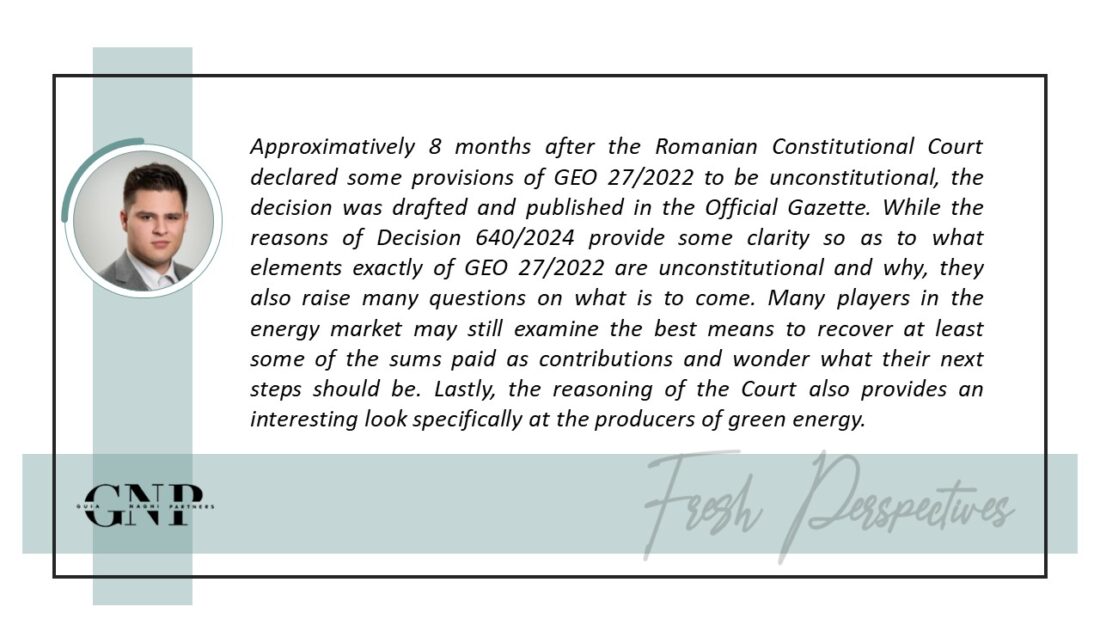Mălin Unguru – The transition of the Energy Transition Fund: The what and why of the unconstitutionality of GEO 27/2022
How did we get here?
The provisions of Article 15 of GEO 27/2022 were first enacted on March 22nd, 2022, and were aimed at imposing an additional tax on electricity producers. Subsequent amendments made through GEO 119/2022 (and Law 357/2022) made it so that producers (among others) had to pay to the state budget any revenue from electricity sales exceeding RON 450/ MWh – “the Windfall Tax”.
This led to a significant number of litigations and unconstitutionality pleas criticizing the Windfall Tax (with some diversity in what regards the legal provisions that are the object of these pleas). While many of these cases are still pending before the Constitutional Court, back in November 2024[1], a first ruling on the (un)constitutionality of the Windfall Tax was rendered – Decision 640/2024.
Until very recently, the reasons behind this ruling had been still unknown, as Decision 640/2024 was still being formally drafted. On June 3rd, 2025, however, the reasoned decision was published in the Official Gazette – no. 515/03.06.2025.
While the reasoned decision provides some clarity as to what is to follow, it likewise raises many more questions as to the future of the Windfall Tax and as to what energy producers (and possibly other players in the energy market) can expect to recover.
The What – what, exactly, is unconstitutional?
In Decision 640/2024, the Court analyzed the following provisions:
- Article 15 of GEO 27/2022 (as in force between September 1st 2022 and December 15th 2022 and from December 16th 2022 onwards) – the provision establishing the obligations of energy producers (among others) to pay the Windfall Tax;
- Annex 6 of GEO 27/2022 (as in force between September 1st 2022 and December 15th 2022 and December 16th 2022 onwards) – which provide how the payable Windfall Tax is determined for electricity producers.
Seeing as Decision 640/2024 concerned Article 15 in its entirety, the first question that may arise is whether the decision concerns only the electrical energy producers or whether other players in the energy market, for example, traders, are also concerned. The answer to this question is important as it may determine other critical consequences to follow, such as who might be entitled to seek for damages or if an additional unconstitutionality plea, in connection to the Windfall Tax affecting those who are not electrical energy producers, may be admissible.
The answer at hand may require some nuance. Despite the fact that Article 15 was declared unconstitutional in its entirety, the Court seems to have analyzed the legal provisions only from the electrical energy producer’s perspective.
To begin with, the Windfall Tax is calculated differently for energy producers – as provided by Annex 6, and for other concerned market players, such as traders – as provided by Annex 61. The pleas analyzed by the Constitutional Court were limited only to Annex 6, and did not concern Annex 61 and the Court limited itself strictly to this component of the Windfall Tax.
Furthermore, in its reasoning, the Court referred exclusively to energy producers (and aggregate entities), without mentioning the situation of market players such as energy traders. In this sense, in its final paragraphs (par. 42) on damages arising from the unconstitutionality of GEO 27/2022, the Court clarified that the decision concerns only damages to be paid to electrical energy producers and aggregate entities.
Lastly, as will be explored below, par. 42 of Decision 640/2024 clarifies that the Windfall Tax is not in itself unconstitutional, but the amount of the contribution is. However, when analyzing the Windfall Tax, the Court referred only to the contributions amounting to any earnings above RON 450/MWh produced, and not to the 2% profit cap under Annex 61.
Despite the fact the Decision is not very clear, we deem many of the considerations of the Constitutional Court on the Windfall Tax calculated under Annex 6 should be also applicable to the contributions under Annex 61.
The Why – the reasoning behind the unconstitutionality of the Windfall Tax
The Court firstly held that the Windfall Tax leads to a depravation of property. It is also noted that the companies targeted by the tax already pay a tax on profit. In this sense, the Court held its previous conclusions that the notion of profit is protected under the right to private property. The Court, therefore, analyzed whether this interference is adequate, necessary and proportionate.
Decision 640/2024 concludes that the objective of the measure is legitimate – as the state acts upon its attribution as a social state under Article 1 par. (3) of the Constitution, in the face of certain destabilizing factors (such as the COVID-19 pandemic).
However, while the Windfall Tax may be able, in abstract, to achieve this goal, it exceeds what is necessary to achieve it. In this sense, the additional earnings cannot be confiscated de facto and thus the state must identify a measure which does not annihilate private property.
As the Court expands, the Windfall Tax is not in itself unconstitutional. The unconstitutionality of this contribution arises from its excessive nature (all earnings above RON 450/MWh) that amounts to a practical confiscation.
Special considerations concerning green energy producers
Decision 640/204 further analyses some of the specific circumstances of green energy producers, as opposed to fossil fuel energy producers. Firstly, the Court holds that the former make significant investments in their production capacities, but these investments are not taken into account when calculating the Windfall Tax.
Furthermore, the measure at hand does not take into account the particularities of producing green energy. In this sense, it also discourages the production of green energy and poses a danger to the transition towards regenerable energy, which is a crucial objective of the European Union.
The Court observes that the fiscal treatment of electrical energy producers may be different in consideration of innovative technologies related to green energy, which may require temporary support in view of reaching the fundamental objectives of the national strategy on energy. This support may be reevaluated in the future, when the earnings and costs associated with such producers are balanced, in order to ensure equal treatment between enterprises.
The How – the issue of damages
In its final paragraphs, Decision 640/2024 seems to provide a rough picture of what is to follow.
The Court states that lawmaker must now enact measures in the following 45 days, or the provisions will definitively cease any legal effects. In this sense, according to Decision 640/2024, the Government or the Parliament should establish:
- A new level of the Windfall Tax, which may be above 50% of the additional earnings, but may not be so high that it may amount to confiscation and
- A mechanism and a reasonable deadline to refund or compensate the difference between the contribution owed under the unconstitutional provisions and the amount owed under the new provisions.
Decision 640/2024 also holds that, so far as its application is concerned, damages are to be paid only to electrical energy producers who raised the plea of unconstitutionality or who have claims already filed before the courts for the refund of contributions amounting to Windfall tax, which are dated before the publication of the decision in the Official Gazette (June 3rd, 2025).
These last considerations will be of great importance to any operators that did not yet initiate a claim, and we expect there to be debates on both the applicability of Decision 640/2024 and the award of damages under Article 9 of Law 554/2004.
[1] Violeta Geru, Levelling the playing field: The Constitutional Court ruling that energized producers https://www.gnp.ro/violeta-geru-levelling-the-playing-field-the-constitutional-court-ruling-that-energized-producers/





No Comments